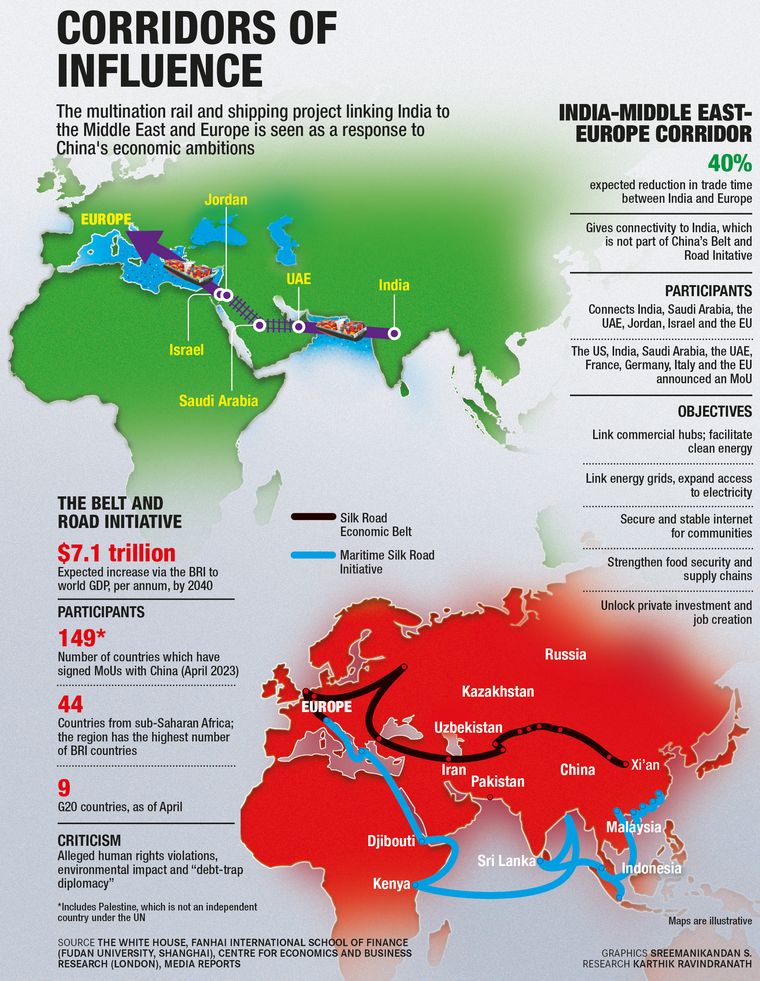In the end, the success of a gathering is determined by an afterparty. Prime Minister Narendra Modi has ensured that the G20 summit in Delhi will have one. A virtual G20 summit will be held in November before the presidency is passed on to Brazil. Russian Foreign Minister Sergey Lavrov has already assured his presence. Meanwhile, Modi’s millet menu passed the G20 test at the specially curated summit lunch. And Akshata Murthy went back with a Banarasi stole. The gifts were customised to suit the sensibilities of the guests and to reflect the relations that India has with each country.
India’s presidency has changed the composition of the G20, opening the doors for Africa and its 1.4 billion people. “The expansion to include the African Union is quite momentous,’’ said former ambassador Rajiv Bhatia, who authored a report on India-Africa relations. By 2030, every fifth person on earth will be African, so the continent’s inclusion has come at an apt time. “The inclusion of the AU changes the dynamics of the room,’’ said Harsh Pant of the Observer Research Foundation. “It shows India’s ability to lead and to move from ideas to action.” It is a tangible win for Modi’s efforts. Despite Covid and the global economic slump diverting some attention from India’s efforts to woo Africa, it opened 18 new missions on the continent. External Affairs Minister S. Jaishankar has made six trips to Africa just this year. And the efforts are all set to continue.
“From 2002, when India launched the Focus Africa Programme, the funds have grown from $2 billion to almost $100 billion,’’ said retired ambassador Gurjit Singh, who heads the CII task force on the Asia Africa Growth Corridor. India has moved on from providing lines of credit to African countries to a foreign direct investment model. The summit lauded the rescheduling of the debt burden of Zambia, Ethiopia and Ghana under the Common Framework for Debt Treatment, an initiative endorsed by the G20. “India has emerged as the leader of the Global South,’’ said Singh.
For Modi, the successful summit has turned out to be the perfect launch pad for the Lok Sabha elections. Even pollution stayed away, ensuring a blemish-free summit. From a diplomatic perspective, however, the biggest takeaway has been bringing the world on the same page on contentious issues. “On Ukraine, India forged a middle path,’’ said Bhatia. It was a Herculean task, which took more than 200 hours of negotiations. But India proved to be the glue that could bind together disparate opinions on the issue.
“India has become the interlocutor between G7 and the Global South,’’ said Singh. That was why there was nothing much about Russia in the joint statement; it was not an issue for the Global South. “It is this trilateral cooperation that we are witnessing. The new connectivity project between the Middle East, Europe and India is very much a result of this cooperation,” said Singh.
While G7 members may have wanted stronger language on Russia―evident from their news conferences on the sidelines―they did not want to be on the wrong side of history. The softer language, which refrained from condemning Russia, was significant, as it may signal a new thought process about the future course of the war. So far, the only country to criticise the declaration is Ukraine.
The collective assent to the Delhi Declaration is not only a display of team spirit―which India displayed in ample measure by joining hands with South Africa and Brazil―but also a celebration of carefully crafted bilateral relations India has with most countries, very much like the curated gifts that went back with each leader. “There is a new dynamic in play,’’ said Pant. “India has demonstrated, especially to China, that it has excellent relations with the west, something which Beijing can only dream of.”
At a time when China had counted on the absence of President Xi Jinping at the summit being interpreted as a major snub to Delhi, producing a joint statement was a major success. It has made Beijing uneasy, especially with a Belt and Road Initiative summit coming up. Italy has already conveyed to China that it wants out. Meanwhile, the India-Middle East-Europe project has demonstrated India’s ability to bring together reluctant friends like Saudi Arabia’s Crown Prince Mohammed bin Salman along with European leaders and US President Joe Biden. “India is venturing into the Middle East where China enjoys good relations,’’ said Pant. “It is doing so using America’s heft and by leveraging partnerships.”
The Delhi Declaration is quite a defining moment for G20’s future and it shows India’s influence on a range of issues including digital public infrastructure and climate action. “No conversation without India can be possible on DPI or climate change,’’ said Syed Akbaruddin, India’s former permanent representative to the UN. The need for further reform in the global governance structure is very much at the heart of the declaration.
“It is natural law that persons and institutions that do not adapt to change lose their relevance. With an open mind, we have to consider why many regional forums have emerged in recent years and are proving to be effective,” said Modi at the closing session of the summit. “But the number of permanent members in the UN Security Council stays the same. The world has changed in every respect. Whether it is transport, communication, health or education, every sector has undergone a transformation,” said Modi. “These new realities should be reflected in our new global structure.”



